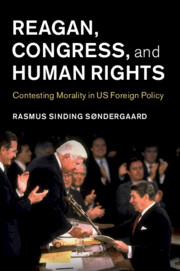Book contents
- Reagan, Congress, and Human Rights
- Human Rights in History
- Reagan, Congress, and Human Rights
- Copyright page
- Contents
- Figures
- Acknowledgments
- Abbreviations
- Introduction
- 1 After the Breakthrough
- 2 The Reagan Turnaround on Human Rights
- 3 The Congressional Human Rights Caucus and the Limits of Bipartisanship
- 4 The Right to Leave
- 5 “A Universal Human Rights Issue”
- 6 Two Tales of Human Rights
- Conclusion
- Bibliography
- Index
5 - “A Universal Human Rights Issue”
South African Apartheid
Published online by Cambridge University Press: 27 March 2020
- Reagan, Congress, and Human Rights
- Human Rights in History
- Reagan, Congress, and Human Rights
- Copyright page
- Contents
- Figures
- Acknowledgments
- Abbreviations
- Introduction
- 1 After the Breakthrough
- 2 The Reagan Turnaround on Human Rights
- 3 The Congressional Human Rights Caucus and the Limits of Bipartisanship
- 4 The Right to Leave
- 5 “A Universal Human Rights Issue”
- 6 Two Tales of Human Rights
- Conclusion
- Bibliography
- Index
Summary
Chapter 5 analyzes how the Reagan administration and members of Congress contested US policy toward South Africa’s apartheid regime of institutionalized racial segregation. The chapter examines the administration’s policy of constructive engagement designed to encourage gradual South African reforms through quiet diplomacy while reaffirming US support for the anti-communist and US-friendly regime. Centered on the Congressional Black Caucus (CBC), the chapter then traces congressional efforts to impose various economic measures against South Africa. It demonstrates how members of Congress collaborated with the wider anti-apartheid movement through participation in protests, staged arrests, and the creation of the Free South Africa Movement. Crucially, members of Congress sought to change US policy through the imposition of economic sanctions through legislation. Tracing the legislative battles over sanctions, the chapter shows how a growing congressional coalition, spearheaded by the CBC, framed apartheid as a human rights issue. Under increasing political pressure to distance themselves from apartheid and constructive engagement, moderate Republicans came to favor sanctions, leading to the imposition of the Comprehensive Anti-Apartheid Act in 1986 overriding a presidential veto. The chapter argues that framing of apartheid as a human rights issue contributed to the successful imposition of sanctions.
Keywords
- Type
- Chapter
- Information
- Reagan, Congress, and Human RightsContesting Morality in US Foreign Policy, pp. 164 - 214Publisher: Cambridge University PressPrint publication year: 2020

